 Ukrainian music star Ruslana gained international fame using Hutzul folklore mixed with barbarian style reminiscent of sword and sorcery subgenre in her Wild Dances
Ukrainian music star Ruslana gained international fame using Hutzul folklore mixed with barbarian style reminiscent of sword and sorcery subgenre in her Wild DancesFor instance, the Wild Energy video allegedly was based on the book Wild Energy.Lana by Marina and Sergey Dyachenko. Its current Wikipedia article presents the plot involving a person who works as "a pixel" in huge public entertainment shows, reminiscent of immense choreographed performances in North Korea or China, even though the same style of acts has been used in the West since at least the Olympics in Los Angeles.
The environment in the video shows clear influences of The Matrix, with high quality special effects and perfectly executed costumes and choreography. The video mainly deals with an escape sequence from futuristic agoraphobic architectural structures, similar to depiction of Neo's rescue in the first part of the trilogy.
The book's plot also seems to reflect the main motive of the Matrix: protagonist exploring the artificial reality imposed on the system and finding the truth about the inner workings of the economy, and constrains placed on the members of the society.
The costumes seem to build upon some of the motives from Wild Energy, like the bat-people who do not personify evil per se. The video presents a long-distance conversation with the American singer T-Pain, who seems to play the role of benevolent spirit/remote conscience, and does not actively participate in the love life of the main protagonists, played by enchanting Ruslana and her dashing blond counterpart. The long-distance effect is stronger in the Ukrainian version of the song as each singer using her and his mother language.
